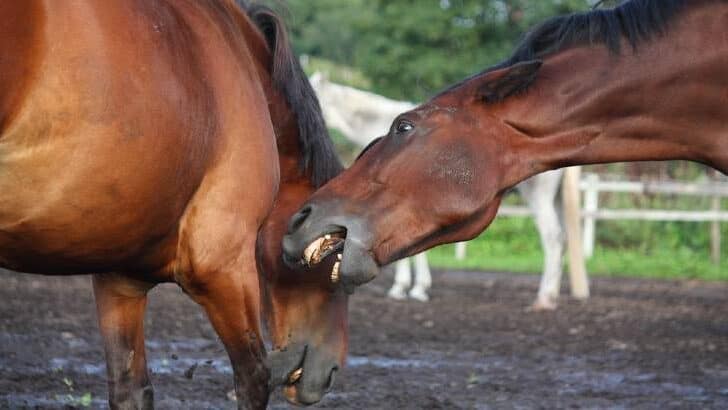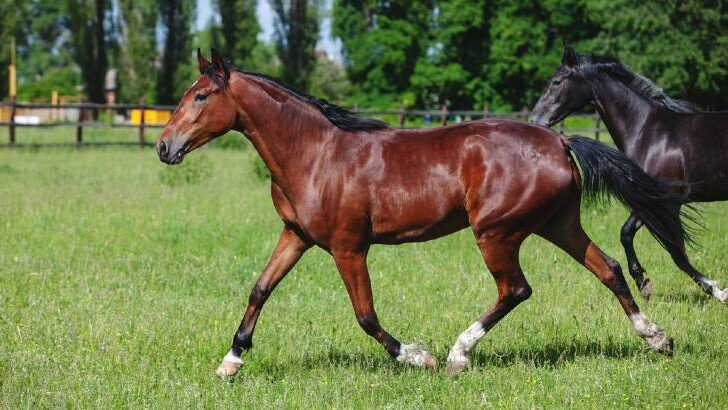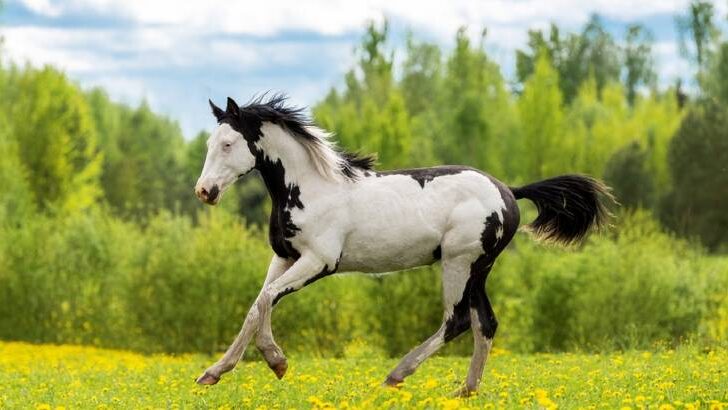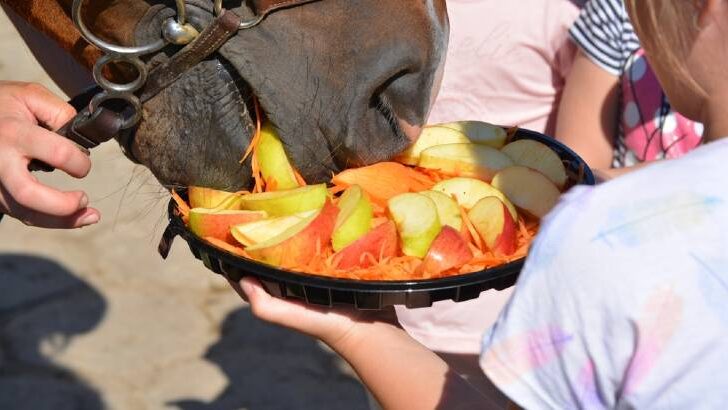Affiliate Disclaimer
As an Amazon Associate I earn from qualifying purchases. It helps me keep the website going. Thank you for your support.
Horses have been human companions for thousands of years. Spending time with horses can be a rewarding and therapeutic experience, but working with horses comes with risks. One of the most common issues horse handlers face is the risk of being bitten. Understanding why horses bite and how to prevent it is crucial for any horse handler.
Horses may bite for various reasons, including pain, dominance, playfulness, attention-seeking, frustration, and hormonal changes. Let’s take a closer look at each reason.
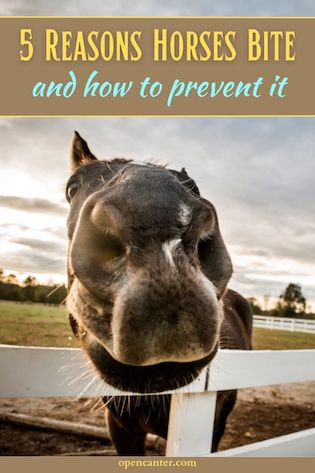
Why Do Horses Bite?
Pain is one of the most common reasons that horses bite.
1) Pain
Horses are known to communicate their discomfort through various behavioral changes, and biting is one such behavior that horse owners need to be aware of.
Biting can be a sign of physical pain, which may be caused by a range of factors. One of the common causes of pain in horses is ill-fitting tack. If the saddle or bridle is too tight or doesn’t fit properly, it can cause significant discomfort and pain to the horse, leading to biting behavior.
Another common cause of pain in horses is dental problems. Horses have large, flat teeth designed for grinding and chewing tough vegetation. These teeth are prone to wear and tear, which can lead to sharp edges, uneven wear, and other dental issues.
If a horse is experiencing dental pain, it may exhibit biting behavior as a way of communicating the discomfort. In addition to dental problems, horses may also suffer from mouth ulcers or other mouth-related issues. These can cause significant pain and discomfort, leading to biting behavior.
2) Dominance
Horses, just like other animals, have a natural instinct to establish a hierarchy within their herd. This hierarchy determines the social order of the group and helps maintain stability and order.
When horses are in a new environment or introduced to new horses, they may use biting as a way of asserting their dominance or establishing their place in the hierarchy. This behavior may also occur when horses feel threatened or insecure. Biting is their way of protecting themselves.
In addition to the need for dominance, biting behavior in horses can also stem from fear, anxiety, or stress. When horses are placed in unfamiliar situations, they may feel uncomfortable and exhibit biting behavior as a way of coping with their anxiety.
Furthermore, if horses are kept in isolation or not given enough social interaction, they may resort to biting as a way of expressing their frustration.
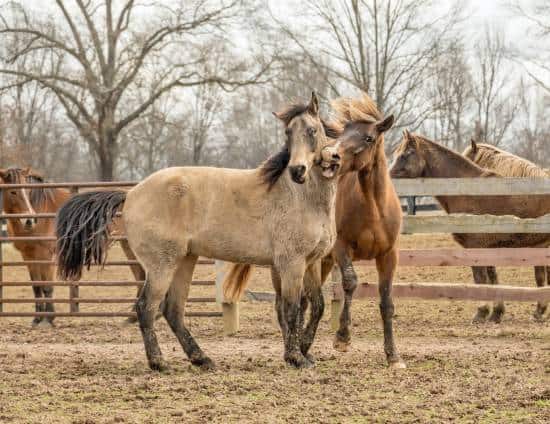
3) Playfulness / Attention-Seeking
Horses, like many animals, have their own unique personalities and behaviors, which means that sometimes biting can be a form of play or attention-seeking behavior.
Playful biting often occurs when a horse is feeling playful and wants to initiate interaction with other horses or humans. This behavior is typically not aggressive, and the horse may use its lips and teeth gently to communicate its desire for play or attention.
It’s important to understand the difference between playful and aggressive biting, as playful biting should not be punished but redirected toward appropriate play.
Horses that are seeking attention may also resort to biting as a way of communicating their needs. In these cases, it’s important to provide the horse with plenty of attention and affection, as well as train them to seek attention in more appropriate ways.
Redirecting a horse’s attention and behavior towards appropriate play and positive reinforcement is key when dealing with playful or attention-seeking biting behavior. Horses, like all animals, respond well to positive reinforcement, so rewarding good behavior is an effective way of discouraging bad behavior.
In the case of playful biting, providing the horse with toys, such as balls or ropes, can help redirect their attention toward appropriate play.
4) Frustration
Horses may exhibit biting behavior when they become frustrated or agitated. This may occur when horses are asked to do something they don’t want to do or are unable to do. In these cases, it’s important to identify and address the source of frustration.
5) Hormonal Changes
Mares in heat or stallions that are sexually frustrated may exhibit biting behavior as a result of hormonal changes. In these cases, it’s important to provide the horse with appropriate outlets for its behavior and address any underlying hormonal issues.
How to Help Horses that Bite
Preventing horses from biting can be achieved through establishing clear boundaries, respecting personal space, positive reinforcement, socialization, proper training, and identifying and addressing underlying health issues. Let’s take a closer look at each prevention method.
Establishing Clear Boundaries:
Establishing clear boundaries is crucial in preventing biting behavior. Horses who bite should be taught to respect personal space and should not be allowed to invade it. If a horse does invade personal space, it’s important to correct the behavior immediately.
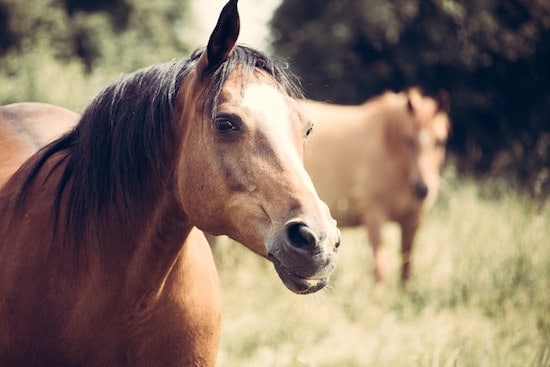
Respecting Personal Space:
Respecting personal space goes hand in hand with establishing clear boundaries. Horses should be given enough space to feel comfortable and safe. When working with horses, it’s essential to move slowly and avoid sudden movements that may startle the horse. You can read more about how to help a horse that spooks here.
Positive Reinforcement:
Positive reinforcement is an effective way to prevent biting behavior. Horses should be rewarded for positive behavior, such as standing quietly while being groomed or accepting a bit.
It’s important to give horses attention and treats when they exhibit behavior the horse finds enjoyable. When the horse exhibits bad behavior, it’s important to withhold attention and not reward it. This helps the horse learn that bad behavior will not be tolerated, and they will not receive attention or treats.
Socialization:
Socializing horses with other horses and people can help reduce biting behavior. Horses that are not socialized may become aggressive toward other horses and humans.
Socializing horses can be done through turnout with other horses and regular handling by different people. When horses are socialized from a young age, they learn appropriate social behavior and are less likely to bite.
Proper Training:
Horses that have not enjoyed proper training will be anxious and inclined to bite. Proper training and socialization are also essential in preventing biting behavior.
Horses should be trained from a young age to exhibit appropriate behavior and to understand what is expected of them. This includes training for basic manners, such as standing quietly, leading, and respecting personal space.
Proper training also includes teaching horses to accept being handled, groomed, and ridden without biting. When training horses, it’s important to use positive reinforcement methods, such as rewards and treats, to encourage good behavior and discourage bad behavior.
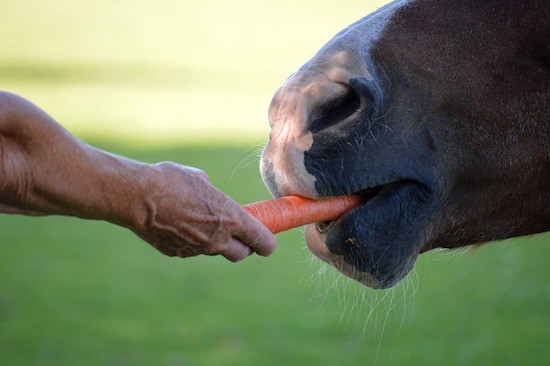
Identifying and Addressing Underlying Health Issues:
As mentioned earlier, pain can be a cause of biting behavior in horses. Therefore, it’s important to regularly check for signs of pain, such as sensitivity in the mouth or reluctance to be ridden. If any signs of pain are observed, it’s crucial to address the issue promptly and seek veterinary assistance.
Understanding the underlying causes of biting behavior in horses is just the first step. It’s also key to recognize the signs of potential biting behavior before it occurs.
Horses may exhibit certain behaviors that signal their discomfort or aggression before biting, such as pinned ears, raised heads, and swishing tails. By recognizing these warning signs, handlers can take steps to prevent biting behavior and avoid potential injury.
Additionally, it’s important to remember that horses are individuals with unique personalities and temperaments. While some horses may be more prone to biting behavior than others, it’s wise to approach each horse as an individual and adapt training methods and handling techniques accordingly.
By taking the time to understand a horse’s personality and preferences, handlers can create a positive and respectful relationship with the horse. This will reduce the risk of biting behavior and promote a safe and enjoyable experience for both horse and rider.
Final Thoughts
As with any animal behavior, it’s essential to approach the issue with patience and consistency. Horses bite for a range of reasons, and sometimes there is no single cause.
Biting behavior won’t be solved overnight, and it may take time and effort to address the underlying causes. However, with proper care, training, and attention, horses can learn to exhibit appropriate behavior and become rewarding companions.
By taking steps to prevent biting behavior, horse owners can create a safe and enjoyable environment for themselves and their horses. It can also save horse owners from injuries to their own hands.

